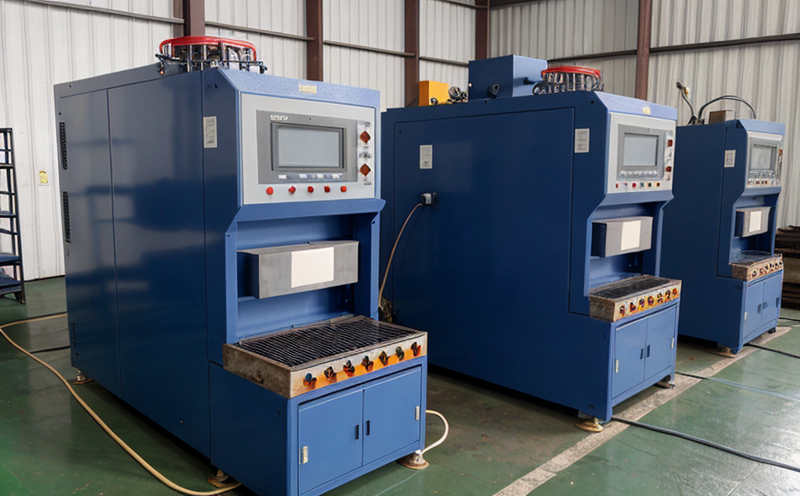GB T24131 Polypropylene Raw Input Testing
The GB T24131 standard specifies methods for testing the quality of raw polypropylene inputs used in industrial manufacturing and processing. This test ensures that the raw materials meet stringent requirements, thereby maintaining product integrity and performance throughout production cycles.
Polypropylene is a widely-used thermoplastic polymer known for its durability, strength, and chemical resistance. It finds applications across various sectors including automotive, packaging, textiles, construction, and more. Ensuring the quality of raw materials like polypropylene is paramount to prevent issues such as contamination, inconsistent properties, or degradation during processing.
The test outlined in GB T24131 focuses on several critical parameters including density, melting point, crystallinity, and mechanical properties. These factors are crucial for the polymer's performance in end-use applications. The testing process involves a series of steps: sample preparation, measurement using specialized equipment, and evaluation against standard criteria.
Sample preparation is a meticulous process to ensure accuracy. It includes cleaning the samples thoroughly, drying them at controlled temperatures, and ensuring that they are representative of the batch being tested. Once prepared, the raw polypropylene undergoes various tests:
- Density measurement using pycnometer or other suitable devices.
- Melting point determination via differential scanning calorimetry (DSC).
- Crystallinity analysis by X-ray diffraction (XRD).
- Mechanical property testing such as tensile strength, impact resistance, and flexural modulus using universal testing machines.
The results of these tests are compared against the standards specified in GB T24131. Any deviations from these benchmarks may indicate issues with raw material quality, which could lead to defects or failures downstream. This comprehensive approach ensures that only high-quality polypropylene finds its way into manufacturing processes.
The industry applications of this test are broad and impactful. For instance, in the automotive sector, ensuring the integrity of polypropylene parts is critical for safety and reliability. In packaging, it guarantees the strength and barrier properties necessary for protecting contents during transit. In textiles, quality control through GB T24131 ensures durability and resistance to environmental factors.
| Industry Sector | Application | Purpose of Testing |
|---|---|---|
| Automotive | Manufacture of parts and components. | Ensures safety, reliability, and performance. |
| Packaging | Creation of containers and packaging materials. | Maintains strength and integrity during transit. |
| Textiles | Production of textile components and accessories. | Guarantees durability and resistance to environmental factors. |
The test not only ensures product quality but also contributes significantly to compliance with international standards. Compliance is essential for accessing global markets, especially in regions where stringent regulations are enforced. By adhering to GB T24131, manufacturers can ensure they meet the requirements set by local and international bodies.
Compliance also fosters trust among customers and stakeholders, enhancing brand reputation. This is particularly important in sectors like automotive and packaging, where product quality directly impacts public safety and environmental considerations.
Industry Applications
The testing of raw polypropylene inputs according to GB T24131 is essential across multiple industries. In the automotive sector, quality control ensures that parts like bumpers and dashboard components are durable and safe. The packaging industry benefits from consistent quality in materials used for containers and wraps. Textiles gain from reliable raw inputs for producing fabrics and accessories.
In construction, high-quality polypropylene is crucial for creating lightweight yet robust structures. In the healthcare sector, ensuring the integrity of medical devices made from polypropylene enhances patient safety. The electronics industry relies on consistent quality to ensure product reliability in harsh environments.
| Industry Sector | Key Components Tested | Purpose |
|---|---|---|
| Automotive | Bumpers, dashboard components. | Durability and safety. |
| Packaging | Containers, wraps. | Integrity during transit. |
| Textiles | Fabrics, accessories. | Durability and resistance to environmental factors. |
The testing process ensures that these industries receive materials that meet the highest quality standards. This is critical for maintaining product integrity, enhancing performance, and ensuring compliance with international regulations.
Why Choose This Test
Selecting GB T24131 polypropylene raw input testing offers numerous advantages. Firstly, it ensures that the materials used in manufacturing processes meet the strictest quality standards set by international organizations like ISO and ASTM. Secondly, compliance with this test standard helps businesses gain a competitive edge by ensuring product reliability and consistency.
The test is also crucial for maintaining high standards of safety and performance across various industries. For instance, in automotive applications, using materials that do not meet these standards could lead to recalls or even accidents. In packaging, inconsistent quality can result in leaks or damage during transit.
In addition to ensuring product quality, the test fosters trust among customers and stakeholders. This is particularly important for sectors like healthcare and electronics where brand reputation is paramount. By adhering to GB T24131, businesses can ensure that they meet global market demands and regulatory requirements.
The testing process also helps in reducing production costs by minimizing waste and rework. Ensuring that raw materials are of high quality from the start reduces the need for additional processing or disposal of substandard materials. This leads to more efficient manufacturing processes and lower operational costs.
Competitive Advantage and Market Impact
- GB T24131 ensures product reliability and consistency, which is crucial for maintaining customer trust.
- Compliance with this standard helps businesses gain a competitive edge by ensuring product quality.
- The test fosters trust among customers and stakeholders, enhancing brand reputation.
- It reduces production costs by minimizing waste and rework through high-quality raw materials.
The market impact of adhering to GB T24131 is significant. By ensuring product reliability and consistency, businesses can build a strong reputation in the market. This is particularly important for sectors like automotive, packaging, textiles, and electronics where brand reputation is crucial.
The test also helps in reducing production costs by minimizing waste and rework through high-quality raw materials. This leads to more efficient manufacturing processes and lower operational costs. In competitive markets, these cost savings can provide a significant advantage over competitors who may not adhere to such stringent quality standards.





